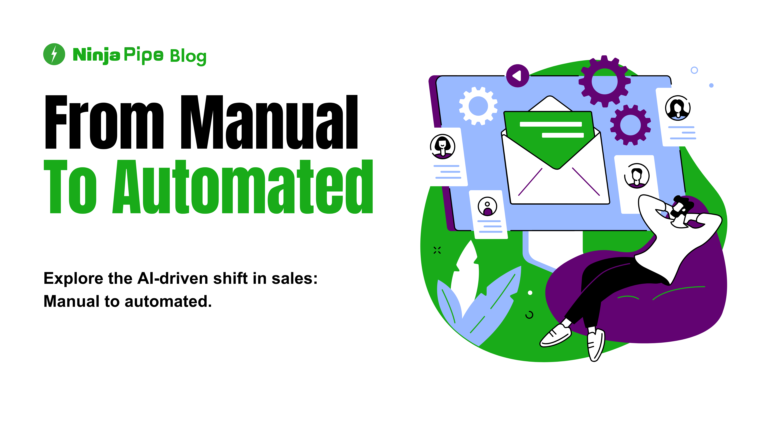Elevate your sales game with AI automation. Discover the advantages of integrating AI in your sales strategy for unprecedented growth.
Sales teams have long been the backbone of businesses worldwide, driving revenue growth and forging customer relationships. However, the traditional sales approaches that have served us well for decades are no longer sufficient in the digital age. Enter AI sales automation – a groundbreaking solution that has the potential to revolutionize your sales strategy. In this article, we explore the benefits of implementing AI sales automation and how it can transform your sales process, from lead generation to customer engagement and performance optimization.
Introduction
Developing an effective sales strategy is crucial for businesses to stay competitive in today’s rapidly changing market landscape. Sales teams must adapt to evolving customer expectations and navigate complex buyer journeys. This article delves into the role of AI sales automation and its benefits in empowering sales organizations to level up their strategies and drive growth.
1. Understanding Sales Strategy
1.1 The Importance of an Effective Sales Strategy
In the dynamic business environment, having a well-defined sales strategy is essential. It outlines the goals, target markets, and tactics that enable sales teams to achieve revenue targets consistently. An effective sales strategy aligns the efforts of every team member, streamlining processes and providing a systematic approach to drive conversions.
1.2 Challenges in Traditional Sales Approaches
Traditional sales approaches often rely heavily on manual processes and intuition-based decision-making. This approach poses several challenges, including inconsistent lead qualification, limited sales forecasting accuracy, and time-consuming administrative tasks. To overcome these challenges and unlock sales potential, organizations are turning to AI sales automation.
2. Enter AI Sales Automation
2.1 What is AI Sales Automation?
AI sales automation refers to the integration of artificial intelligence capabilities into various stages of the sales process. It leverages machine learning algorithms and data analysis to automate repetitive tasks, uncover insights, and deliver personalized experiences to prospects and customers. This technology empowers sales teams by augmenting their capabilities and enabling data-driven decision-making.
2.2 The Role of AI in Revolutionizing Sales
AI brings forth a new frontier in sales, enabling organizations to leverage vast amounts of data and generate actionable insights. By automating mundane tasks, such as lead scoring and data entry, AI frees up sales representatives’ time, allowing them to focus on high-value activities. Furthermore, AI-powered predictive analytics equips sales teams with accurate sales forecasting, enabling better resource allocation and strategic planning.
3. Key Benefits of Implementing AI Sales Automation
3.1 Enhanced Lead Generation and Qualification
With AI sales automation, businesses can supercharge their lead generation efforts by leveraging predictive algorithms to identify high-value prospects. By analyzing historical customer data, AI systems can predict the likelihood of conversion, enabling sales teams to prioritize their efforts effectively. This not only saves time but also improves the overall quality of leads generated.
3.2 Improved Sales Forecasting and Predictive Analytics
Predicting future sales trends and accurately forecasting revenue is vital for business planning. AI sales automation equips organizations with powerful predictive analytics capabilities, leveraging historical data, market trends, and external factors. By harnessing these insights, sales leaders can make informed decisions and allocate resources optimally, leading to higher accuracy in sales forecasting.
3.3 Personalization and Customer Engagement
In an era where personalization is paramount, AI sales automation enables businesses to deliver tailored experiences to their customers. By analyzing vast amounts of data, AI systems can understand customer preferences, behavior patterns, and buying history. This allows sales teams to engage with prospects and customers more effectively, offering personalized recommendations and solutions that resonate with their needs.
3.4 Streamlined Sales Process and Increased Efficiency
Automation is a game-changer when it comes to streamlining sales processes. By automating time-consuming administrative tasks, such as data entry and report generation, AI sales automation frees up valuable time for sales reps to focus on building relationships and closing deals. This increased efficiency leads to higher productivity, quicker sales cycles, and ultimately, improved revenue generation.
3.5 Sales Performance Monitoring and Optimization
With AI sales automation, organizations gain real-time insights into the performance of their sales teams. AI-powered analytics tools track key performance indicators (KPIs), such as conversion rates, deal velocity, and customer engagement metrics. This enables sales leaders to identify areas for improvement, provide targeted coaching, and optimize sales processes for better results.
3.6 Cost Reduction and Resource Optimization
Implementing AI sales automation can lead to significant cost savings for organizations. By automating repetitive tasks, businesses can reduce the need for manual labor, allowing teams to focus on high-value activities. Additionally, the ability to optimize sales processes and allocate resources efficiently leads to cost reduction and increased ROI.
4. Overcoming Concerns and Challenges
4.1 Ensuring Data Privacy and Security
As with any technology that involves handling sensitive data, ensuring data privacy and security is of utmost importance. Organizations must adopt robust data protection measures, adhere to regulatory requirements, and utilize secure AI platforms to safeguard customer information and maintain trust.
4.2 Integrating AI into Existing Sales Practices
Integrating AI sales automation into existing sales practices requires careful planning and change management. Sales teams must be equipped with the necessary skills to leverage AI effectively and be prepared for process adjustments. Seamless integration and continuous collaboration between humans and AI systems are key to successful implementation.
4.3 Addressing Workforce Transformation and Skill Gaps
The introduction of AI in sales processes may raise concerns about job displacement. However, AI is designed to augment human capabilities, not replace them. Organizations should focus on upskilling sales teams, helping them develop the necessary skills to work hand-in-hand with AI systems, leveraging the technology to enhance their performance and productivity.
5. Real-World Success Stories
5.1 Company A: Boosting Conversion Rates with AI Sales Automation
Company A, a leading e-commerce business, implemented AI sales automation to enhance their lead nurturing efforts. By leveraging AI algorithms to analyze customer behavior data, they personalized their communication strategies and automated targeted email campaigns. As a result, they achieved a 30% increase in conversion rates and a significant boost in customer satisfaction.
5.2 Company B: Sales Process Optimization with AI-driven Insights
Company B, a software-as-a-service (SaaS) provider, integrated AI sales automation into their sales processes. They used AI-powered analytics tools to track key sales metrics and gain actionable insights into their pipeline. By optimizing their sales process based on these insights, they experienced a 25% reduction in the sales cycle duration and a substantial increase in revenue.
6. Implementing AI Sales Automation in Your Organization
6.1 Assessing Your Sales Processes and Needs
Before implementing AI sales automation, it is essential to assess your existing sales processes and identify pain points. Understanding your organization’s unique requirements will help you determine which areas can benefit most from AI-powered solutions.
6.2 Choosing the Right AI Sales Automation Solution
Selecting the right AI sales automation solution is crucial for success. Consider factors such as functionality, scalability, integration capabilities, and vendor reputation. Engage with vendors, request demos, and evaluate how their solutions align with your organization’s specific needs.
6.3 Pilot Testing and Deployment
Conduct pilot testing to evaluate the effectiveness of the chosen solution in a controlled environment. Test its integration, performance, and impact on sales processes. Once you have validated the solution’s value, deploy it gradually across relevant sales teams, providing adequate training and support.
6.4 Continuous Monitoring and Adaptation
Implementing AI sales automation is an ongoing process. Monitor and analyze its performance, gathering feedback from sales teams and customers. Continuously refine and adapt your processes to optimize results, leveraging AI-driven insights and staying ahead of the competition.
Conclusion
In an era of digital transformation, businesses need to level up their sales strategies to thrive. AI sales automation presents an unprecedented opportunity to enhance lead generation, customer engagement, and sales performance. By embracing this technology, organizations can streamline processes, maximize efficiency, and achieve sustainable revenue growth in a competitive marketplace.
FAQs
Q1. How does AI sales automation benefit small businesses?
AI sales automation benefits small businesses by enabling them to compete on a level playing field with larger organizations. It automates repetitive tasks, reduces costs, and provides valuable insights to drive growth and optimize sales processes.
Q2. Will AI sales automation replace human sales professionals?
No, AI sales automation is designed to augment human sales professionals, not replace them. It empowers sales teams by automating mundane tasks, allowing them to focus on building relationships and providing personalized experiences to prospects and customers.
Q3. Can AI sales automation improve sales forecasting accuracy?
Yes, AI sales automation utilizes predictive analytics to improve sales forecasting accuracy. By analyzing historical data and market trends, AI systems can provide sales leaders with more accurate insights for resource allocation and strategic planning.
Q4. How can AI sales automation help in lead qualification?
AI sales automation leverages predictive algorithms to enhance lead qualification. By analyzing customer data and behavior patterns, AI systems can identify high-value prospects and prioritize sales efforts, resulting in higher-quality leads.
Q5. What challenges should organizations consider when implementing AI sales automation?
Organizations should address concerns related to data privacy and security, ensure seamless integration with existing sales practices, and focus on upskilling the workforce to work effectively with AI systems. Overcoming these challenges will lay the foundation for successful implementation.








Leave a Comment